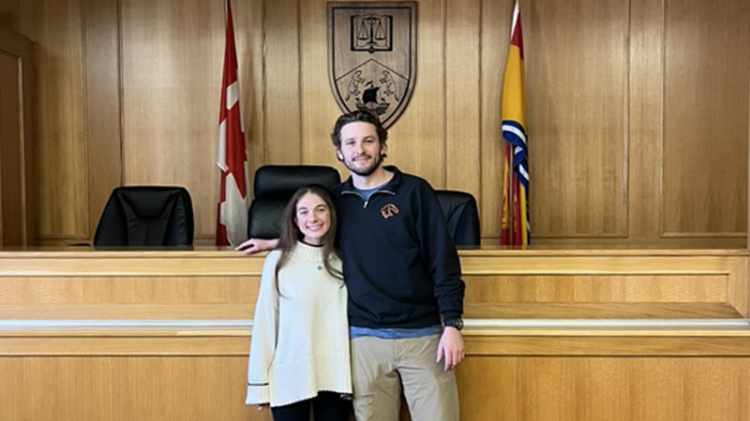University of New Brunswick (UNB) law student Eddie May became interested in Canada's energy future as a commerce student at the University of Victoria.
There, he learned of the Cedar LNG project in Kitimat, B.C., in the territory of the Haisla Nation.
"The interesting thing for me was the large equity stake of the Indigenous group involved and the joint ownership aspect of that resource project. I thought that would be an interesting growth area of the Canadian economy, and an obvious direction for future energy and resource projects regarding Indigenous involvement," May recalled.

Photo: Abbie Formoso, vice president, and Eddie May, president, of the new UNB Law Future of Energy Club.
His fellow law student, Abbie Formoso, studied health sciences for her undergraduate degree. This required her to take courses on public health and the environment.
"I've always been interested in natural resources and energy, and regulations affecting public health came to my attention. Law school seemed like an option for me because of the policy issues," she said.
The idea to start a law club devoted to the future of energy in Canada came to May last summer when he wondered if other UNB law students might share this interest. May and Formoso, who are currently in their second year, along with a committed executive team started the UNB Law Future of Energy Club at the beginning of the 2024 fall semester.
"It seemed like a great opportunity for students to have a bit of a no-stress zone to teach and learn from other students and delve into the particulars of energy and natural resources law. It can help students work on their public speaking and soft skills that can be daunting in a classroom setting at law school," May said.
"I was blown away by how many people we had signed up. It was a lot more than expected, which was fantastic. It confirmed my hunch that others wanted to learn about the subject," he said.
May and Formoso are now the club's president and vice-president respectively. Formoso said the club has about 25 members from diverse backgrounds.
"It is very collaborative because we have people who are familiar with different areas and have unique exposure. I'm from Ontario and Eddie is from Alberta. We have people from Atlantic Canada and people from Manitoba and British Columbia. Everyone has their own views and opinions about traditional and renewable energy sources shaped by their previous lived experiences," she said.
"This club is a good opportunity for us to talk about that and connect with people from around Canada. We want to use the club to explore the subject."
The club holds monthly meetings where students can engage in discussion or present on energy-related topics.
"We are planning to schedule guest lectures next semester, supplementing industry knowledge and insight into the club's teachings," said May.
Formoso said the club aims to be an "engaging and active" student space that encourages diverse viewpoints.
"It's also very low stakes. People can choose when they want to take a front seat and present about a topic they are interested in, or if they just want to come and sit for an hour and listen," she said.
Formoso added that awareness of all sides of an issue is crucial for lawyers entering the energy and natural resources field.
"I think there's something to be said for being aware of different opinions and perspectives and the reasons behind them," she said.
"I think the aim of any academic club is to hear everybody's perspectives and benefit from them," May added.
The club has already made connections outside of UNB Law. Four members, including May and Formoso, attended the Marine Renewables Canada 2024 Conference in Halifax in November.
It was an experience they found invaluable because they got to mingle with professionals in other fields who shared their interest in Canada's energy future.
"Understanding where the markets are going, and where and what kind of growing pains they are already having and expect to have, helped us gain a broader understanding of regulatory issues these energy developers are having," said May.
Formoso was struck by the conference's focus on the next generation of energy professionals.
"Everyone we talked to focused on us as the youth and the next generation taking on these problems after we finish school and get out into the world," she said.
Also in November, the club hosted a presentation and discussion on legislative frameworks and case law affecting Canada's oil and gas sector.
May and Formoso hope the club will thrive long after graduation and alumni will attend and share knowledge.
"If 10 years down the road, when I'm practising law and the club is still around, maybe I can come back and be a guest speaker. That would be probably the icing on the cake for me," said May.
Formoso shared a similar hope for the club's future impact.
"It's just exciting to think where it could go in five years. This is just our first year and we have already attended a conference and hope to have guest speakers."
May and Formoso are focused on strengthening the club and planning to collaborate with other academic departments, faculties and industry stakeholders.
"We first want to establish ourselves this year and build a solid foundation," said Formoso.










